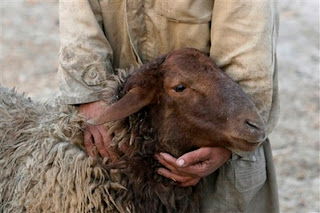 Always on the cutting edge of scientific breakthrough...
Always on the cutting edge of scientific breakthrough...Iran says first cloned sheep thriving
ISFAHAN, Iran - Iranian scientists said Monday that the country's first cloned sheep is thriving 15 months after birth, eating well and frolicking among a flock of normal sheep. The cloned male sheep named Royana was born Sept. 30, 2006 in the historic central city of Isfahan, less than two months after the country's first cloned animal, also a lamb, died within minutes of birth.
But unlike it's predecessor, Royana survived the postnatal complications typical for cloned animals and is now celebrated as Iran's scientific breakthrough and achievement.
The effort is part of Iran's quest to become a regional high-tech powerhouse in western Asia by 2025. Tehran has also launched an ambitious space program, while its controversial uranium enrichment has the West worried it is masking Iran's attempts to build a nuclear weapon.
"Royana is a successful scientific achievement. We are all proud of it. The sheep is the result of many years of efforts in stem cell research," Mohammad Hossein Nasr e Isfahani, head of the Royan Research Institute in Isfahan told The Associated Press on Monday.
Isfahani, an embryologist whose team oversaw Royana's birth and that of its cloned predecessor, said his institute conducted 30 successful stem cell transfers but that only two led to birth.
His team members say that out of 10 animal cloning pregnancies, only one or two can be expected to lead to birth.
In 1996, British scientists made international headlines with Dolly, the first cloned sheep, which lived six years.
No comments:
Post a Comment